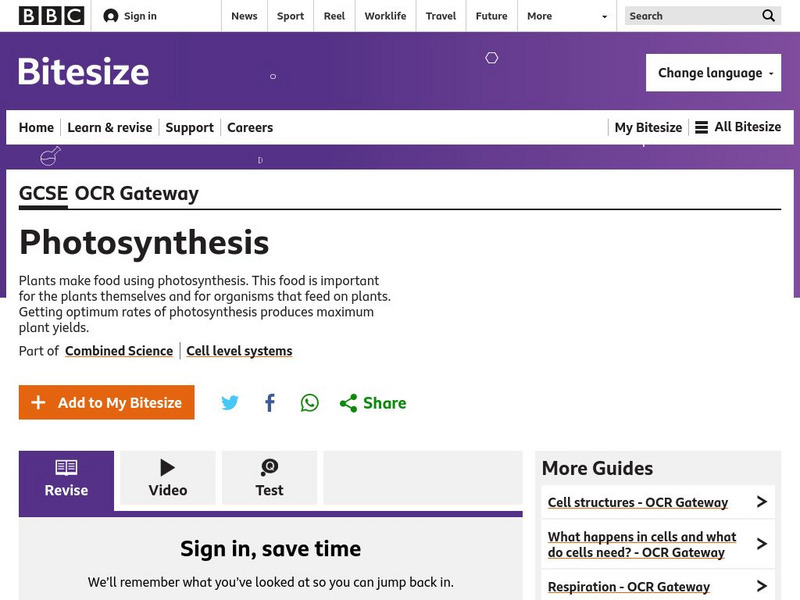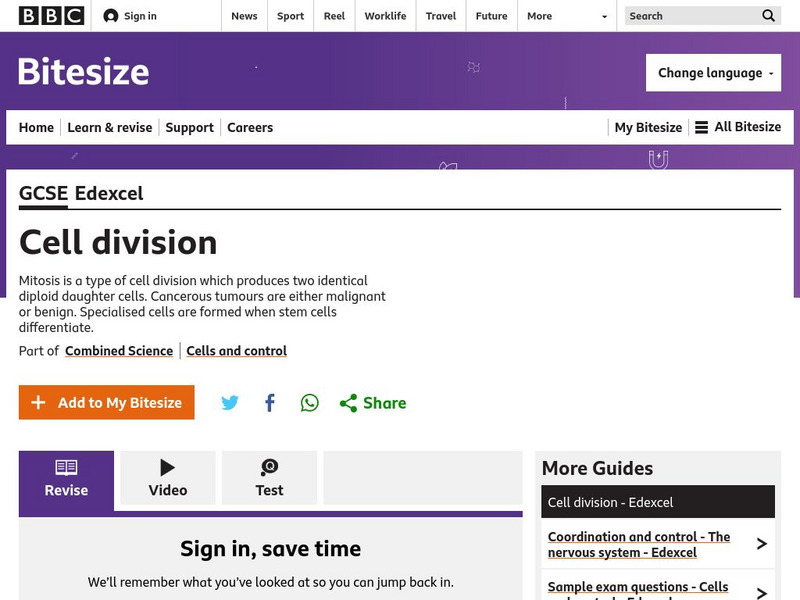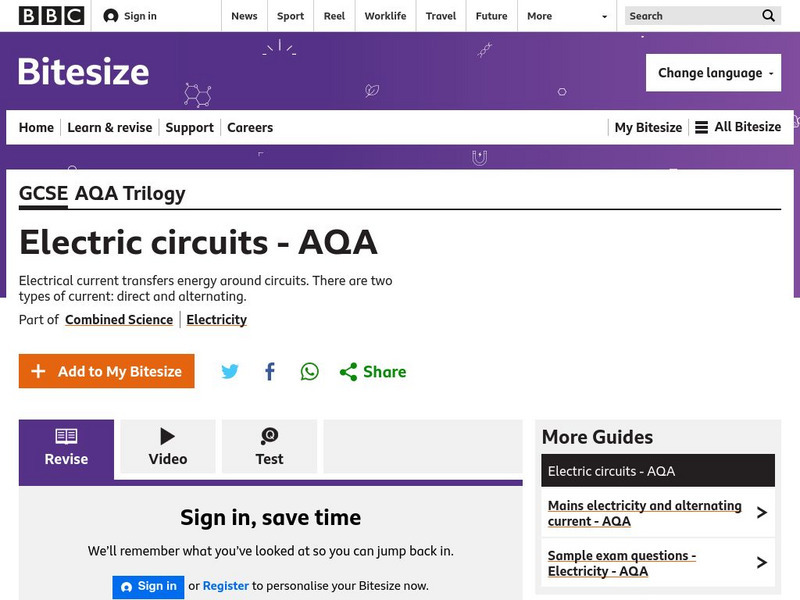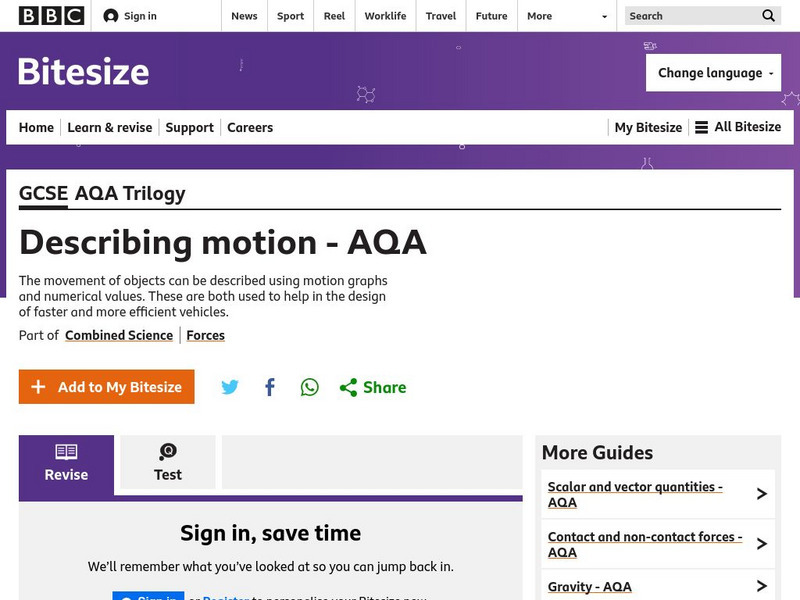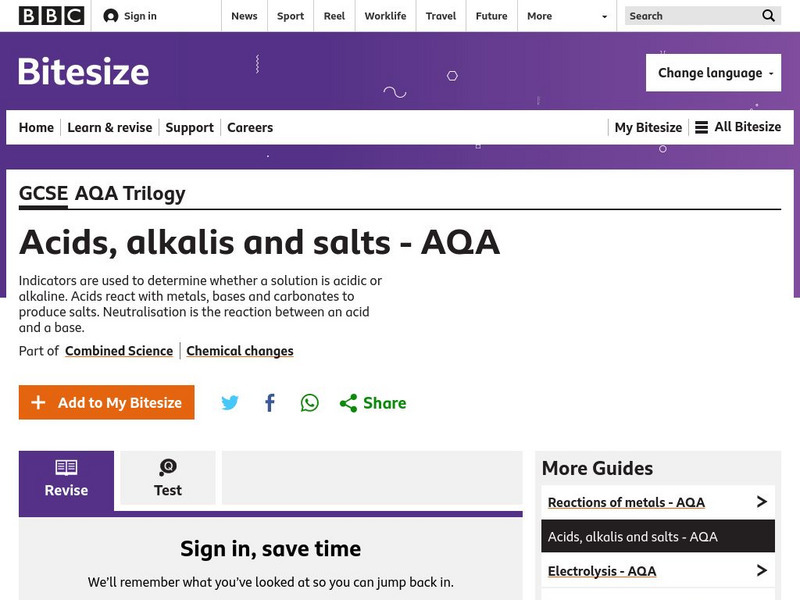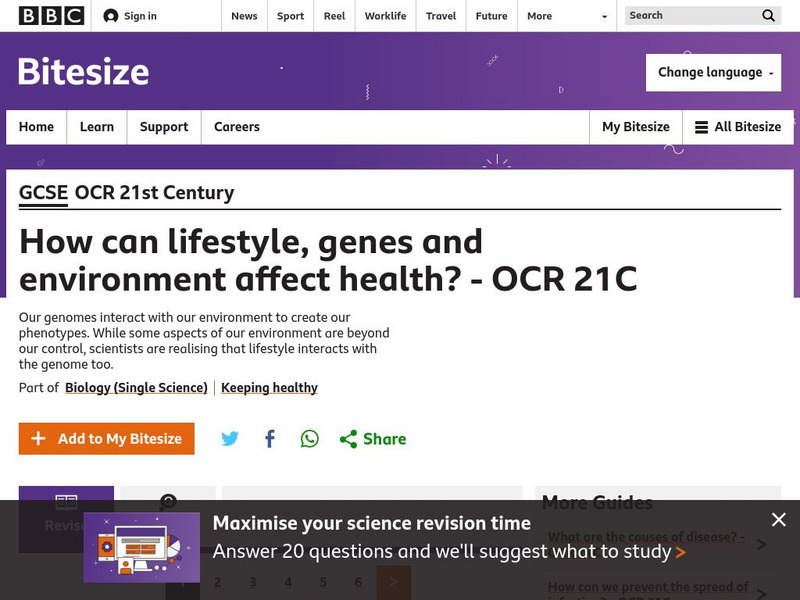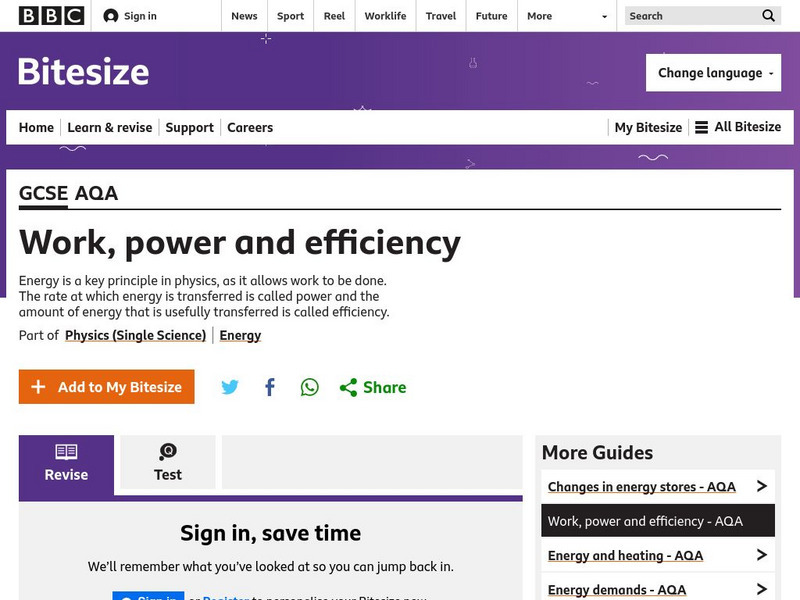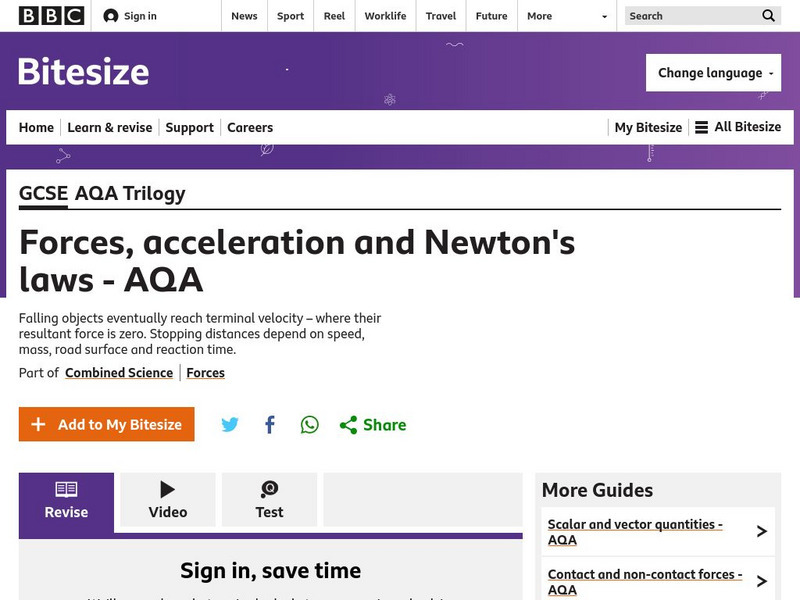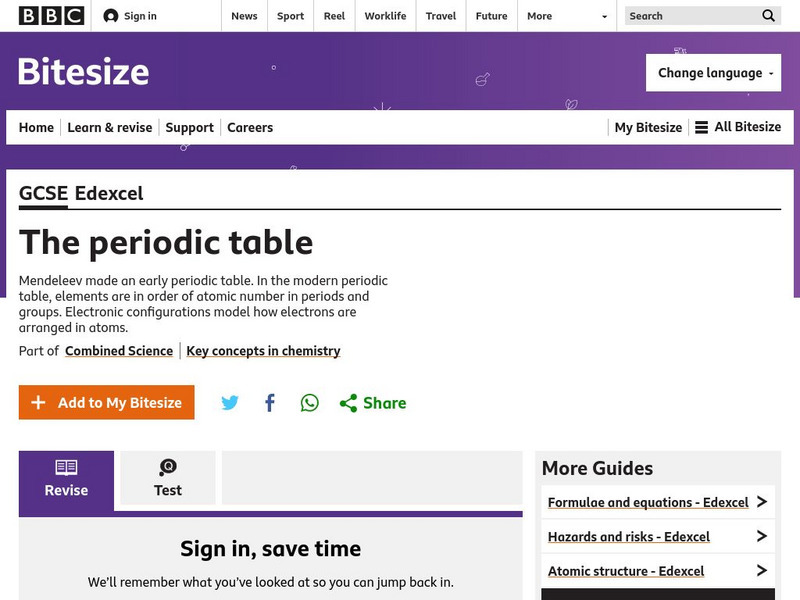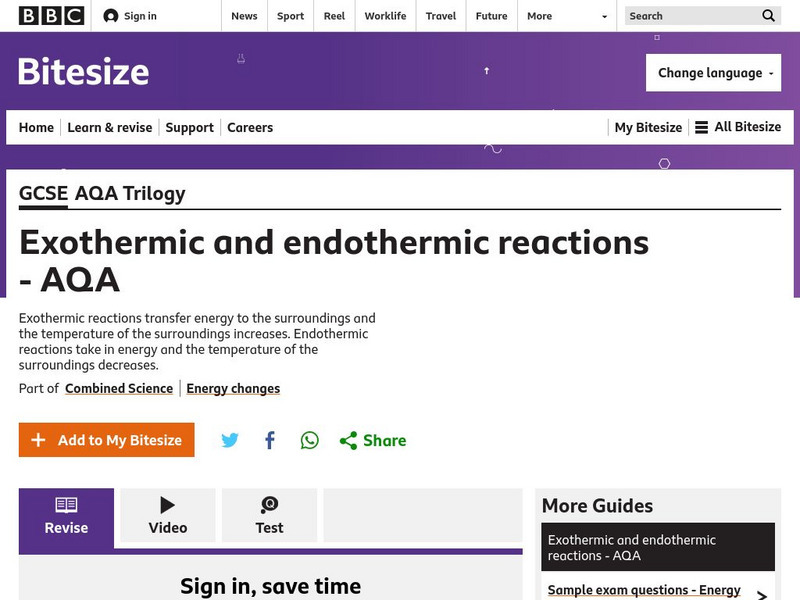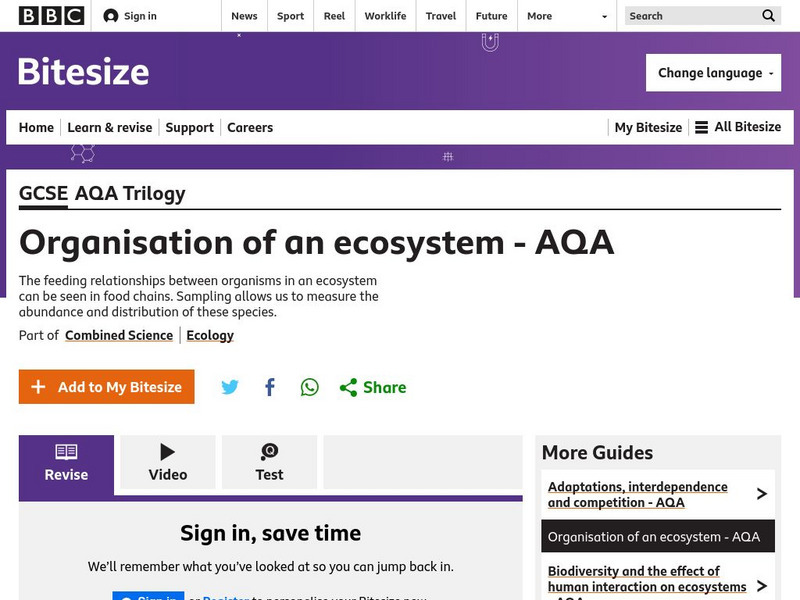BBC
Bbc: Gcse Bitesize: Photosynthesis
This lesson focuses on photosynthesis including what it is, the word and symbol equations for photosynthesis, how it works, and how the extra glucose is used. It also offers links to a video and a test.
BBC
Bbc: Gcse Bitesize: Mass, Weight and Gravitational Field Strength
This lesson focuses on gravitational fields and includes what one is, the formula for gravity force, defining weight, formula for mass, an example of how to calculate gravity force, a practice question, and a link to a test.
BBC
Bbc: Gcse Bitesize: Cell Division
This lesson focuses on cell division including how chromosomes are formed from DNA, how many chromosomes there are in the human body, and diagrams of cell division. It also provides links to a video and a test.
BBC
Bbc: Gcse Bitesize: Uses and Dangers of Radiation
This lesson focuses on radiation including background radiation, natural and man-made sources of radiation, how to measure amounts of radiation, examples of doses of radiation and a link to a test.
BBC
Bbc: Gcse Bitesize: Electric Circuits Aqa
This lesson focuses on Electrical circuits including standard symbols for electrical components, a list of components and what they do, a discussion of various types of resistors, and alternating current and direct current. Links to a...
BBC
Bbc: Gcse Bitesize: Mains Electricity and Alternating Current Aqa
This lesson focuses on Mains Electricity and Alternating Current. Electrical supplies can be direct current (DC) or alternating current (AC). The UK mains electricity supply is about 230V at 50 Hz. It explains the difference between AC...
BBC
Bbc: Gcse Bitesize: Describing Motion Aqa
This lesson focuses on Distance-time graphs; the gradient of a distance-time graph represents the speed of an object.
BBC
Bbc: Gcse Bitesize: Radioactive Emissions
This lesson focuses on radioactive emissions including radioactive decay, half-life, using half-life, how to calculate net decline, a table showing how the count rate of an isotope might change over time, and a link to a test.
BBC
Bbc: Gcse Bitesize: Predicting Chemical Reactions
This lesson focuses on the physical properties of halogens, Group 7 elements on the Periodic Table. It includes the physical properties of the elements, provides a graph showing the melting and boiling points of the halogens, and links...
BBC
Bbc: Gcse Bitesize: Science
This site provides links to exams for four science courses by Bitesize: GCSE Biology, GCSE Chemistry, GCSE Combined Science, and GCSE Physics.
BBC
Bbc: Gcse Bitesize: Acids, Alkalis and Salts Aqa
This lesson focuses on acids and alkalis including acidic and alkaline solutions, neutral solutions, indicators and the pH scale, the colors for litmus paper, and a link to a test.
BBC
Bbc: Gcse Bitesize: Genetic Inheritance Aqa
This lesson focuses on genetic key terms; it defines them and explains what they do. It provides links to a video and a test.
BBC
Bbc: Gcse Bitesize: Animal Organization Digestion Aqa
This lesson focuses on the structures of carbohydrates, proteins, and lipids including defining terms, a brief discussion of what they do, and diagrams of each. It also provides a link to a test.
BBC
Bbc: Gcse Bitesize: The Life Cycle of a Star
This lesson focuses on the formation and life cycle of stars. Stars form when enough dust and gas clump together because of gravitational forces. Nuclear reactions release energy to keep the star hot. Some stars grow larger over time....
BBC
Bbc: Gcse Bitesize: Analyzing and Identifying Substances Aqa
This lesson focuses on analyzing and identifying substances. Substances can be analyzed using a variety of methods including paper chromatography, gas chromatography and mass spectrometry. After reading about the different techniques,...
BBC
Bbc: Gcse Bitesize: How Can Lifestyle, Genes and Environment Affect Health? Oc
This lesson focuses on Cardiovascular disease. The heart requires its own constant blood supply in order to keep beating and this is delivered through the coronary arteries. Genetic and lifestyle factors can lead to the coronary arteries...
BBC
Bbc: Gcse Bitesize: Communicable Diseases
This lesson focuses on communicable diseases that are caused by bacteria including Gonorrhea and Salmonella. Links to a video and a test are provided.
BBC
Bbc: Gcse Bitesize: Treating, Curing and Preventing Disease
This lesson focuses on developing and testing new drugs including their safety, effectiveness, and dosage; and the three main stages of testing. A link to a test is provided.
BBC
Bbc: Gcse Bitesize: Adaptations, Interdependence and Competition
This lesson focuses on how plants and animals live together in a community or ecosystem by adapting, interdependence, and competition.
BBC
Bbc: Gcse Bitesize: Work, Power and Efficiency
This lesson focuses on energy and power. Energy is a key principle in physics, as it allows work to be done. The rate at which energy is transferred is called power and the amount of energy that is usefully transferred is called...
BBC
Bbc: Gcse Bitesize: Forces, Acceleration and Newton's Laws Aqa
This lesson focuses on Newton's First Law: an object remains in the same state of motion unless a resultant force acts on it. If the resultant force on an object is zero, this means: a stationary object stays stationary; a moving object...
BBC
Bbc: Gcse Bitesize: The Periodic Table
This lesson focuses on the periodic table and the configurations. In the modern periodic table, elements are in order of atomic number in periods and groups. Electronic configurations model how electrons are arranged in atoms. A link to...
BBC
Bbc: Gcse Bitesize: Exothermic and Endothermic Reactions Aqa
This lesson focuses on Exothermic and Endothermic Reactions. Exothermic reactions transfer energy to the surroundings. Endothermic reactions take in energy from the surroundings. It provides links to a video and a test.
BBC
Bbc: Gcse Bitesize: Organization of an Ecosystem Aqa
This lesson focuses on the organization of an ecosystem. The feeding relationships between organisms in an ecosystem can be seen in food chains. Sampling allows us to measure the abundance and distribution of these species. It provides...


